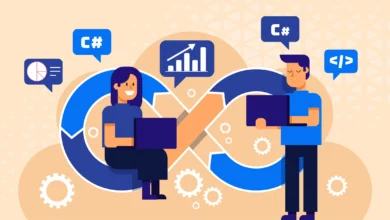Roles, Responsibilities, and Salary Information for DevOps Engineers

Contents Page
- What Exactly Is a DevOps Engineer?
- How Do You Get a Job as a DevOps Engineer?
- Roles and Responsibilities of a DevOps Engineer
- Career Path in DevOps
- Salary of a DevOps Engineer
In every conventional firm, the development team generates goods, while the operations team oversees and maintains these products. The DevOps idea, on the other hand, is a collaboration between development and operations teams that enables continuous delivery of applications and services to end users.
This means that once the development team has completed the product, it is immediately moved to the maintenance and management phases before being delivered to end customers.
DevOps will be in high demand in the future, according to InformationWeek, with little prospect of slowing down. By 2026, the DevOps industry will be worth $14.9 billion, demonstrating that demand will remain strong.
But, before we get into how to become a DevOps engineer, we must first answer the question, “What is a DevOps engineer?”
What Exactly Is a DevOps Engineer?
A DevOps engineer is an IT professional who is well-versed in the software development lifecycle. They must comprehend why the company was forced to switch from one model to another, the problems of the prior model, the advantages of the new model, and so on.
A DevOps engineer must also be proficient in the usage of numerous automation technologies for the development of continuous integration and continuous deployment (CI/CD) pipelines. This high-demand profession necessitates a unique set of DevOps abilities, which we shall discuss in further detail later.
A CI/CD pipeline is divided into steps. The first stage is planning, which entails creating an algorithm for your product. The following stage is the construction stage, in which the algorithm is translated into a usable product.
The product is subsequently tested at the testing stage, where any bugs are discovered and fixed. Finally, the product enters the deployment stage, where it is introduced to end users. Once the product is delivered, it must be continuously monitored, which is a new notion that has recently been incorporated into the DevOps lifecycle.
In comparison to the previous stages, DevOps engineers place a greater emphasis on monitoring. It is critical to regularly monitor the product for new defects, patch them, and return the updated version to the client. This is done to assure client happiness after the product is released into the wild. DevOps engineers work with development and operations teams to provide high-quality products as quickly as feasible.
A DevOps engineer can also pursue other careers, such as:
- Architect for DevOps
- Engineer in automation
- The software tester
- Specialist in integration
- Engineer in security
- Manager of Publication
- How Do You Get a Job as a DevOps Engineer?
Learn how to become a DevOps engineer by viewing the infographic below.
Let’s take a closer look at a more complete explanation to gain a better idea of how to become a DevOps engineer. But first, let us define what it means to be a DevOps engineer. Roles and Responsibilities of a DevOps Engineer.
A DevOps engineer collaborates with both the development and operations teams to design and deploy software solutions. As a result, they must work with software developers, quality assurance professionals, and other IT personnel. The following are the primary duties and responsibilities of a DevOps engineer:
- Create documentation for the server-side functions.
- IT solutions must be developed, installed, tested, configured, and maintained.
- Communicate operational needs and development forecasts to the entire team.
- Create plans and processes to improve and expand the present technology in use.
- Using configuration management software, automatically deploy updates into the production environment.
- To ensure the production environment functions well, perform frequent application maintenance and troubleshooting.
- Conduct a gap analysis to find performance enhancements, alternative solutions, and adjustments.
- Career Path in DevOps
Fundamentals of Programming Languages and Linux
DevOps develops and automates software using programming languages. To become a DevOps engineer, you must understand numerous programming languages as well as specific DevOps technologies.
Ruby, Python, and JavaScript are the three most commonly used languages with DevOps technologies. To work with DevOps technologies, it is recommended that you understand at least one of these programming languages.
A DevOps Engineer must also understand the principles of the Linux Command Line Interface (CLI). The following are the required Linux abilities for a DevOps engineer:
- Bash or ksh is the Linux shell.
- Linux commands include find, grep, awk, and sed.
- nslookup and netstat are networking commands.
- Management of Source Code
The next step in a DevOps engineer’s career is to master source code management. Regardless of the number of code sets you have, this is critical for keeping your projects structured. Learn at least one of the following common source code management tools:
- Git
- CVS
- Mercurial
You might begin by using any of these source code management solutions. We do, however, recommend that you start using Git. Git is a version control system that can handle large projects and track changes in source code. It also makes it simple for several developers to collaborate.
Development of an Application
A DevOps engineer must understand how to construct an application and commit to a source code management tool. Maven, an automation tool that helps build and manage software projects in a short period of time, is one of the most common approaches to create an application. Maven has a simple build process, supports parallel builds, and provides instant access to new features without the need for additional configurations.
Automation Using a CI/CD Tool
To develop an application, you’ll need a project object model (POM) file. The POM file contains a list of jars to be used, as well as instructions to run, build plugins, and a build profile.
DevOps engineers should employ continuous integration or continuous development (CI/CD) tools. There are numerous CI/CD tools available, including Jenkins, TeamCity, Drone, and others.
It is an open-source continuous integration tool that aids in the automation of the continuous development, testing, and deployment of freshly developed code. Jenkins is important to learn because:
- It has a number of plugins.
- It’s simple to deploy across numerous machines.
- It is simple to install and configure.
Application Evaluation
After you’ve completed the build process, you’ll need to understand how to automate the testing of web apps. Selenium is one of the greatest testing solutions for QA teams, offering quick execution, scripting in multiple languages, and parallel test execution.
Deployment of Applications
To deploy an application, you must be familiar with the appropriate containers and configuration management tools.
Docker
Docker is a handy technology for delivering software in containers. It is highly scalable and efficient, has usable data quantities, and segregated applications.
Ansible
Ansible is a configuration management solution that does not require an agent. Unlike other solutions in this industry, it allows you to push configurations to several servers and keep them in the required state.
Applications
Another crucial part of a DevOps engineer is application monitoring. Nagios is a well-known application monitoring solution that enables comprehensive monitoring, high availability, and quick correction.
Cloud Service Providers
A DevOps engineer must be familiar with cloud service providers and their fundamental applications. Whatever field you work in, cloud computing is a crucial skill to learn.
AWS is the industry’s most popular cloud service today. Many businesses put their infrastructure on the cloud because it gives greater scalability, flexibility, and security. It is more cost-effective than other cloud providers.
Other cloud providers, such as Microsoft Azure and Google Cloud Platform, are gradually catching up.
You should be aware of the wage prospects in the area when learning how to become a DevOps engineer. After all, if you intend to stay in DevOps for the long haul, you need make sure it’s a financially viable option, right? In the following part, you can learn about the salary of a DevOps engineer.
Salary of a DevOps Engineer
The salary of a DevOps engineer may vary depending on the amount of years of experience and qualifications you have. Glassdoor estimates the wage trends of a DevOps engineer in the United States and India as follows:
- A DevOps engineer’s annual pay in the United States is $105,107. (as of mid-December 2021).
- In India, the average income for a DevOps engineer is INR 700,000 per year.
- Get DevOps Certified!
A DevOps certification ensures that you have mastered the skills and knowledge required for continuous integration and development. There are various DevOps certifications available to you:
- DevOps Postgraduate Program
- Certification in DevOps
- Course for Certified Kubernetes Administrator (CKA) Certification
- Jenkins Certification Training Course for CI/CD Pipelines
- Course for Docker Certified Associate (DCA) Certification
- Certification in Puppet and Ansible
- DevOps Engineer Training
Whether you want to learn how to become a DevOps engineer or pursue another career path in DevOps, the future seems promising. Consider obtaining certification in this field. You can also upskill and broaden your knowledge base by enrolling in the Post Graduate Program in DevOps, which will provide you with job-ready skills. The DevOps Free Course will teach you the foundations of DevOps if you’re just starting started.




